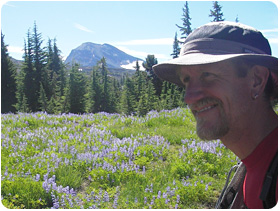Ecampus fact
Ranked top 10 in the nation
Oregon State is ranked on a list of America’s best online bachelor’s programs for the 11th year in a row.
Faculty Profiles
Ron Reuter
 Instructor
Instructor
Natural Resources, Forest Resources and Crop & Soil Science
Dr. Ron Reuter's article, "Introductory Soils Online: An Effective Way to Get Online Students in the Field," was published in the 2007 issue of Journal of Natural Resources and Life Science Education. The article was the "Society Science Feature" in the American Society of Agronomy. Below, he discusses what motivated him to write the article and why he is dedicated to online learning.
What prompted you to ensure online soils students got time in the field and what prompted you to write the article?
I developed the soils course largely to aid the online Natural Resources degree. As a professional soil scientist, I couldn't imagine a natural resources professional without a basic soils course under their belt. And for me, and most other soil scientists I talk to, it is impossible to understand what soil really is without getting a little dirty in a soil pit. However, when I talked to other soil educators at other universities, they had skepticism about being able to convey soil principles to someone not directly in a lab classroom. The article on the class is my way of letting others in the natural resources education field know that it is possible and give them some ideas as to how to develop a class.
Did you help design the course that offered online students the lab component?
I developed the course in 2003 to 2004 using ideas that I had experimented with and some simple do-at-home ideas that I had been reading about. I realized that while my students might not get as quantitative with measurement as a student in an on-campus lab would, they would still be getting the essential concept. And for a 200-level general education science class, that is the level we are shooting for. Laboratory assignments are designed help understand principles for a science. This is really important for soils principles. I realized that we don't have to do exacting laboratory measures to convey those principles, and designed the labs accordingly.
How do you think getting your message out will change lab components for online students?
In a course like this, where the idea is to help clarify principles, labs can be designed for students at home, and without much investment. For other sciences, such as organic chemistry or molecular biology, the tools and chemicals needed are fairly pricey and sometimes not available to typical students. There can be strict laws on transport or containment of some of the materials. So it won't be as easy for all sciences. And as you move into advanced levels, such as soil chemistry or soil physics, the hurdles to offering a home-based lab to a distance student are larger.
What do you see as the advantages of taking classes online?
Online classes give students freedom to complete readings and assignments on their schedule rather than being tied to the 9 a.m. to 4 p.m. schedule of the typical university. A lot of the students I've had online are working students and complete their classwork in the evenings and weekends, when most professors don't hold classes. Also, as an instructor, I've been exposed to a wide range of working professionals with diverse experiences and opinions. Most of the time, this adds to the educational component of the class; not just for me but the other students, too. Having students in 10 different states and three different countries all in the same class really makes for dynamic interactions. It keeps a course from becoming monotonous.
Why do you feel it is important to support online learning?
I have to say that I don't think online learning is for everyone, because there is a self-motivation that is required to pursue a degree online. My observations as both an instructor and an advisor for distance students suggests that some folks would be better off in the structured environment of on-campus courses. But, online education is important because it provides access to a quality education that place-bound students wouldn't otherwise have.
What has been the biggest surprise to you about online learning?
How much I learn by teaching online. Every class is a new group of students with a diverse set of experiences. The wide range of geographic settings they take me to helps me become more familiar with the places of the world I have never been. And that's something that I value when I teach these classes.
Get more info about our online Natural Resources degree.
Back to Faculty Profiles.
Features and Navigation
Academic calendar
Currently it's summer term. See academic calendar for our quarter term schedule.
Fall term starts Sept. 24.
Winter term starts Jan. 5, 2026.

